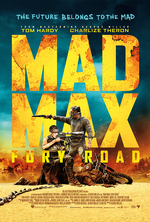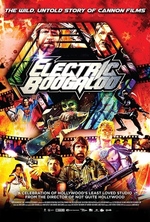Film Screening 4th July, 2015

Mad Max: Fury Road
7:00 PM, 4th July, 2015
No Guests
- MA
- 120 mins
- 2015
- George Miller
- George Miller, Brendan McCarthy, Nick Lathouris
- Tom Hardy, Charlize Theron, Zoë Kravitz, Nicholas Hoult
If it worked the first time, and the second, and the third, then you can bet the fourth instalment of this post-apocalyptic feature film franchise will have you bouncing in your seats.
The first Mad Max’s dystopian world graced Australian cinemas in 1979 and soared to record-busting profit heights. The newest film, Fury Road, comes 36 years after its predecessor, though this violent and dusty wasteland of a world has hardly improved since then.
A simple story. Laconic loner Max (Hardy) meets Furiosa (Theron) who wants to cross the desert in search of answers from her childhood home. A sun scorching, gun blazing, revving adventure ensues. Will they be able to restore some peace and order in this crazed broken land of maniacs?
Mad Max’s original director, George Miller, returns and is joined by co-writer and comic artistic polymath Brendan McCarthy for a beautifully crafted, stylised tribute to the original. Max failed in the last three movies; but this time, with even more horsepower and sculpted bodies on hot sand, maybe he will succeed.
Alexandra Lamb

Electric Boogaloo: The Wild, Untold Story of Cannon Films
9:10 PM, 4th July, 2015
- M
- 106 mins
- 2014
- Mark Hartley
- Mark Hartley
- Molly Ringwald, Dolph Lundgren, Bo Derek, Mimi Rogers
In 1979, two enthusiastic Israeli cousins entered the American film market. Menahem Golan and Yoram Globus, soon to be known simply as Golan-Globus or ‘The Go-Go Boys’, took over Cannon Films and, over the next decade, delivered a regular schedule of some of the strangest and most utterly 1980s of films – films featuring Ninjas, bad special effects, violence, nudity, sexploitation, breakdancing, vampires, aliens and, most shockingly, occasional moments of genuine quality cinema. This is the story of their rise and fall, complete with frequent indiscreet anecdotes from disgruntled actors, writers and directors with tales of dubious producing, casting, scripting, special effects and financing.
Mark Hartley returns to the well of documentaries about exploitation cinema that has served him so well with Not Quite Hollywood and Machete Maidens Unleashed, and finds another angle on the cinema of pure gratuitous entertainment. With a more direct focus dealing with just one film-making company rather than several, we get a real sense of the frequently insane behaviours behind the scenes (although it should be noted, neither Golan nor Globus is interviewed, for reasons that will become apparent by the end of the film). For anybody who cares about cinema enough to wonder how the sausage is made, it’s another fun romp through the highlights of a dodgy cinematic decade with all the explosions, breasts and kicks to the face you’d expect.
Simon Tolhurst